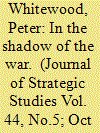| Srl | Item |
| 1 |
ID:
181202


|
|
|
|
|
| Summary/Abstract |
This article examines Soviet perceptions of subversive and military threats from Poland to the Soviet Union in the 1920s and early 1930s. Drawing on archival materials from the Soviet foreign ministry, Communist Party leadership and security organs, it shows how the Soviet leadership held exaggerated fears about Polish threats to the Soviet western border regions and military intervention. A pattern of misperception stemmed from the Bolshevik defeat to Poland in the 1919–20 Soviet-Polish War, which rather than moderating the early Soviet regime ultimately encouraged more widespread use of state violence and provided further rationale for Stalin’s ‘Revolution from Above’.
|
|
|
|
|
|
|
|
|
|
|
|
|
|
|
|
| 2 |
ID:
137479


|
|
|
|
|
| Summary/Abstract |
Stalin's purge of his military elite during 1937–1938 is one of the most unusual events of the Great Terror. Why would Stalin execute his most qualified officers at the same time as defence spending was rising and a world war was approaching? This article argues that a long history of the Red Army being perceived as vulnerable to subversion is central to understanding this military purge. When faced with perceived plots in the military Stalin tended to lean towards restraint, but by 1937 he felt he could no longer hesitate, and finally cracked down on what he saw as a compromised army.
|
|
|
|
|
|
|
|
|
|
|
|
|
|
|
|
| 3 |
ID:
109100


|
|
|
|
|
| Publication |
2011.
|
| Summary/Abstract |
The Great Terror was a defining moment of the Stalin era, indeed perhaps the defining moment of 20th century Russian history. The purge of the military is a striking subplot with the potential to unlock the mystery which still surrounds the Terror. Why did Stalin feel the need to decimate his general staff and officer corps on the eve of a world war at the same time as military spending was rising at a breakneck pace? Why destroy with one hand while building with the other? There is no adequate solution to this problem in the existing literature, and recent work does fully not take into account the great wealth of archival materials released in the last 20 years. This historiographical review will seek to evaluate the historiography of the military purge in showing how the literature has evolved, highlighting the diversity of approaches, where there is consensus, where unanswered questions remain, and how it is now possible to advance a more comprehensive explanation of the purge of the military.
|
|
|
|
|
|
|
|
|
|
|
|
|
|
|
|